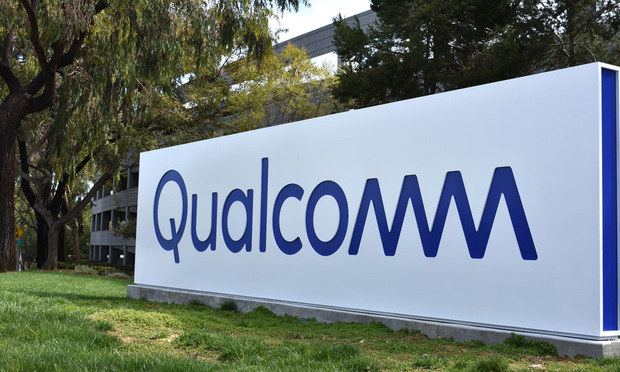Chip Makers Face Tough Decisions Following Judge Koh's Qualcomm Ruling
The judge's ruling this week in the FTC's antitrust case against Qualcomm could be a game changer for licensing disputes in the 3G, 4G and 5G spaces.
November 08, 2018 at 06:20 PM
4 minute read

Chip suppliers are going to face some challenging decisions in the wake of U.S. District Judge Lucy Koh's ruling this week in the Federal Trade Commission's antitrust action against Qualcomm Technologies Inc.
The question will be whether to accept Koh's decision that they're required to license their standard-essential patents to chip-making competitors or continue brushing them off.
“It's a very sobering ruling for large-scale standard-essential patent holders, especially in the 3G, 4G, 5G licensing space,” Goodwin Procter counsel Monte Cooper said. “It's only one district court judge's interpretation” of a chip supplier's commitment to fair, reasonable and non-discriminatory (FRAND) royalties, “but it's a very influential district court judge in a very influential case.”
Koh ruled Tuesday that when Qualcomm signed on with standard-setting organizations such as the Telecommunications Industry Association, Qualcomm promised to license its standard-essential patents (SEPs) at FRAND rates not only to handset makers, but also to competing chip makers.
She looked to two Ninth Circuit decisions involving FRAND disputes between Microsoft and Motorola Mobility. “Those binding precedents are clear: a SEP holder that commits to license its SEPs on FRAND terms must license those SEPs to all applicants,” Koh wrote.
Cooper has been following the Qualcomm litigation as a veteran of SEP licensing and litigation and as counsel to Sequans Communications, one of numerous third parties in the case. If major SEP holders such as Ericsson and Nokia accede to Koh's ruling, it will likely depress the royalty income they earn not only on phones, but other consumer items like drones, even cars. But if they continue refusing to license competitors, they could risk getting hauled into court and accused of breaching their FRAND obligations.
“It's definitely going to make life more complicated for SEP holders in the 3G and 4G space,” he said. “That's going to be a tough decision for in-house [attorneys] to make.”
The FTC sued Qualcomm in January 2017, in the wake of antitrust actions by the governments of South Korea, China, Taiwan and the EU that resulted in nine-figure penalties.
The FTC alleges that Qualcomm has violated its FRAND obligations in two ways: by refusing to license to competitors and by threatening to withhold chips from handset makers who won't pay its going rate. Both strategies leverage Qualcomm's monopoly power in violation of state and federal antitrust law, the FTC alleges.
Tuesday's ruling addressed only the FTC's first allegation. It focused on commitments Qualcomm made to standard-setting organizations to license its SEPs “to all applicants under terms and conditions that are reasonable and non-discriminatory.”
Koh granted partial summary judgment to the FTC that those commitments are binding contracts and apply not only to handset makers but competing chip suppliers such as Intel Corp. She pointed out that in the Microsoft v. Motorola cases, the Ninth Circuit held that such commitments apply “to all comers” and that an SEP holder “cannot refuse a license to a manufacturer who commits to paying the RAND rate.” The Federal Circuit, too, has held that SEP holders must grant licenses to “an unrestricted number of applicants.”
“Qualcomm is unable to identify any court that has made a contrary statement about the scope of a SEP holder's FRAND commitments,” she wrote.
Further, she reasoned, TIA guidelines accompanying the agreements specifically identify “a willingness to license all applicants except for competitors of the licensor” as an example of discriminatory conduct under the TIA IPR policy. That language isn't part of the contract, but it's extrinsic evidence of the contracting parties' intent under California law, she wrote.
This content has been archived. It is available through our partners, LexisNexis® and Bloomberg Law.
To view this content, please continue to their sites.
Not a Lexis Subscriber?
Subscribe Now
Not a Bloomberg Law Subscriber?
Subscribe Now
NOT FOR REPRINT
© 2025 ALM Global, LLC, All Rights Reserved. Request academic re-use from www.copyright.com. All other uses, submit a request to [email protected]. For more information visit Asset & Logo Licensing.
You Might Like
View All

'A Never-Ending Nightmare': Apple Sued for Alleged Failure to Protect Child Sexual Abuse Survivors

'The Hubris of Big Tech': Apple Hit With California Labor Lawsuit for Alleged Free Speech, Privacy Violations

Jury Says $118M: Netlist Wins Another Patent Verdict Against Samsung
4 minute readTrending Stories
Who Got The Work
Michael G. Bongiorno, Andrew Scott Dulberg and Elizabeth E. Driscoll from Wilmer Cutler Pickering Hale and Dorr have stepped in to represent Symbotic Inc., an A.I.-enabled technology platform that focuses on increasing supply chain efficiency, and other defendants in a pending shareholder derivative lawsuit. The case, filed Oct. 2 in Massachusetts District Court by the Brown Law Firm on behalf of Stephen Austen, accuses certain officers and directors of misleading investors in regard to Symbotic's potential for margin growth by failing to disclose that the company was not equipped to timely deploy its systems or manage expenses through project delays. The case, assigned to U.S. District Judge Nathaniel M. Gorton, is 1:24-cv-12522, Austen v. Cohen et al.
Who Got The Work
Edmund Polubinski and Marie Killmond of Davis Polk & Wardwell have entered appearances for data platform software development company MongoDB and other defendants in a pending shareholder derivative lawsuit. The action, filed Oct. 7 in New York Southern District Court by the Brown Law Firm, accuses the company's directors and/or officers of falsely expressing confidence in the company’s restructuring of its sales incentive plan and downplaying the severity of decreases in its upfront commitments. The case is 1:24-cv-07594, Roy v. Ittycheria et al.
Who Got The Work
Amy O. Bruchs and Kurt F. Ellison of Michael Best & Friedrich have entered appearances for Epic Systems Corp. in a pending employment discrimination lawsuit. The suit was filed Sept. 7 in Wisconsin Western District Court by Levine Eisberner LLC and Siri & Glimstad on behalf of a project manager who claims that he was wrongfully terminated after applying for a religious exemption to the defendant's COVID-19 vaccine mandate. The case, assigned to U.S. Magistrate Judge Anita Marie Boor, is 3:24-cv-00630, Secker, Nathan v. Epic Systems Corporation.
Who Got The Work
David X. Sullivan, Thomas J. Finn and Gregory A. Hall from McCarter & English have entered appearances for Sunrun Installation Services in a pending civil rights lawsuit. The complaint was filed Sept. 4 in Connecticut District Court by attorney Robert M. Berke on behalf of former employee George Edward Steins, who was arrested and charged with employing an unregistered home improvement salesperson. The complaint alleges that had Sunrun informed the Connecticut Department of Consumer Protection that the plaintiff's employment had ended in 2017 and that he no longer held Sunrun's home improvement contractor license, he would not have been hit with charges, which were dismissed in May 2024. The case, assigned to U.S. District Judge Jeffrey A. Meyer, is 3:24-cv-01423, Steins v. Sunrun, Inc. et al.
Who Got The Work
Greenberg Traurig shareholder Joshua L. Raskin has entered an appearance for boohoo.com UK Ltd. in a pending patent infringement lawsuit. The suit, filed Sept. 3 in Texas Eastern District Court by Rozier Hardt McDonough on behalf of Alto Dynamics, asserts five patents related to an online shopping platform. The case, assigned to U.S. District Judge Rodney Gilstrap, is 2:24-cv-00719, Alto Dynamics, LLC v. boohoo.com UK Limited.
Featured Firms
Law Offices of Gary Martin Hays & Associates, P.C.
(470) 294-1674
Law Offices of Mark E. Salomone
(857) 444-6468
Smith & Hassler
(713) 739-1250






